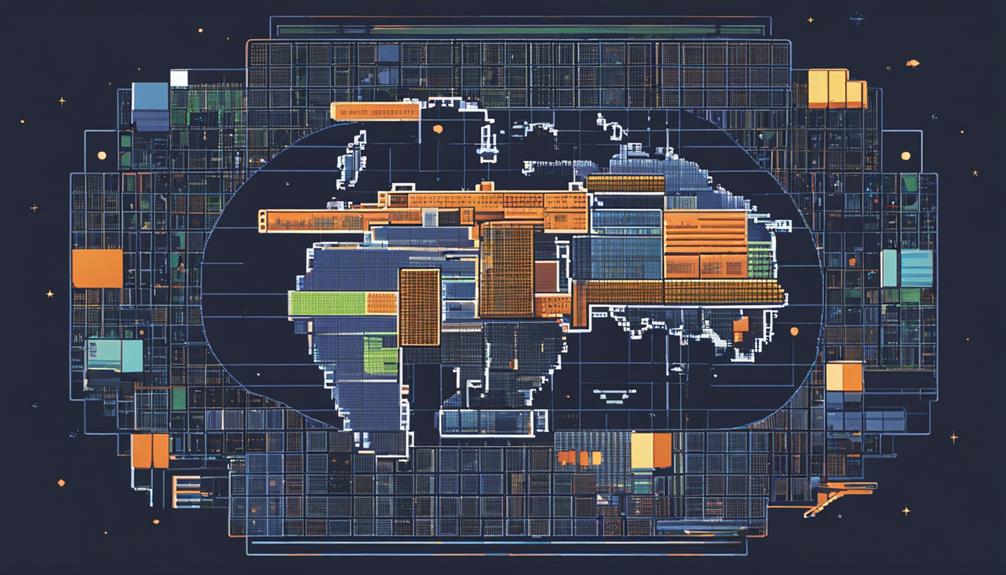In the realm of satellite operations, the realm of privacy and data protection stands as a critical bastion of ethical and lawful conduct. As satellites meticulously gather and transmit vast quantities of data, the need for stringent regulations like the GDPR becomes apparent. However, the complexities of safeguarding data integrity, preventing breaches, and respecting individual privacy rights in this domain are multifaceted. How do organizations navigate this intricate landscape to ensure that satellite operations uphold the highest standards of data protection while advancing technological frontiers?
Key Takeaways
- Strict security measures and encryption are vital for safeguarding satellite data.
- Satellite data collection benefits scientific advancements and disaster response.
- Address privacy concerns with robust data protection measures and regulatory compliance.
- Future trends include advanced encryption standards and transparent data collection practices.
Satellite Operations Data Privacy Concerns

Privacy concerns in satellite operations stem from the extensive collection and transmission of data to Earth, posing risks of unauthorized access and potential privacy breaches. Satellite data, being transmitted from space to ground stations, contains a plethora of information that, if compromised, could lead to severe privacy violations. To address these risks, stringent security measures must be implemented throughout the satellite data lifecycle.
Satellite operators employ various security measures to uphold data privacy. Data encryption plays a crucial role in safeguarding information during transmission, ensuring that even if intercepted, the data remains unintelligible to unauthorized parties. Secure storage practices are equally important, as they protect data at rest from unauthorized access. Additionally, real-time monitoring of satellite data transmission allows operators to promptly identify and respond to any potential security breaches.
Ensuring privacy in satellite operations necessitates a comprehensive approach to data protection. By implementing robust security measures like encryption, secure storage, and real-time monitoring, satellite operators can mitigate the risks associated with unauthorized access and privacy breaches. Prioritizing privacy in satellite data transmission is essential to safeguard sensitive information and maintain the integrity of satellite operations.
Impact of Satellite Data Collection
The extensive collection of satellite data across various sectors, including agriculture, weather forecasting, disaster management, and urban planning, has significant impacts on enhancing decision-making processes and operational efficiencies. Satellite data enables real-time monitoring of environmental changes, deforestation, and natural disasters. Here are four key impacts of satellite data collection:
- Scientific Advancements: Satellite data collection contributes to scientific research, climate studies, and resource management by providing researchers with valuable information on Earth's various ecosystems and climate patterns.
- Environmental Monitoring: Satellite data aids in tracking wildlife migration patterns, ocean currents, and atmospheric conditions, allowing for a better understanding of environmental changes and their impacts.
- Infrastructure Development: Satellite data collection plays a crucial role in improving navigation systems, communication networks, and internet access in remote areas by providing essential data for infrastructure planning and development.
- Disaster Response: Satellite data is instrumental in disaster management by providing real-time information on natural disasters such as hurricanes, wildfires, and floods, enabling authorities to plan and execute effective response strategies promptly.
Privacy Risks in Satellite Technology

Satellite technology presents inherent privacy risks, particularly concerning data security challenges, surveillance implications, and legal compliance requirements. The potential for unauthorized access to sensitive personal information through satellite data raises significant concerns. Addressing these risks necessitates the implementation of robust data protection measures and adherence to stringent privacy regulations.
Data Security Challenges
In the realm of satellite technology, data security challenges present formidable obstacles to the integrity and privacy of transmitted information. To address these challenges effectively, several key measures must be implemented:
- Encryption Protocols: Utilizing robust encryption protocols is essential to secure data transmitted by satellites against unauthorized access and cyber threats.
- Secure Communication Channels: Establishing secure communication channels ensures that data exchanged between ground stations and satellites remains confidential and protected from interception.
- Cybersecurity Measures: Implementing stringent cybersecurity measures can help prevent cyberattacks that may compromise sensitive information and data integrity.
- Privacy Violations Prevention: Proactive measures should be taken to prevent privacy violations resulting from unauthorized access to satellite data, including data breaches and manipulation.
Surveillance Implications
Surveillance implications in satellite technology underscore the critical need for robust privacy safeguards and regulatory oversight to mitigate potential privacy risks. Satellite technology's ability to capture high-resolution images with details down to 30cm per pixel raises significant concerns regarding privacy invasion. Unauthorized access to satellite data can lead to the collection and use of personal information without consent, amplifying privacy risks. The potential misuse of detailed imagery and location tracking capabilities poses privacy hazards that necessitate stringent regulations and privacy protection measures. Mitigation strategies focus on ensuring data security, transparency, and compliance with privacy regulations.
| Privacy Risks | Surveillance Implications | Regulations |
|---|---|---|
| High-resolution imagery | Invasion of privacy | Privacy safeguards |
| Unauthorized data access | Personal information misuse | Regulatory oversight |
| Location tracking capabilities | Privacy hazards | Compliance measures |
Legal Compliance Requirements
Legal compliance requirements play a pivotal role in addressing privacy risks associated with satellite technology operations. To ensure data protection and legal compliance, satellite operators must adhere to regulations such as the General Data Protection Regulation (GDPR) and international laws. Here are four key aspects related to legal compliance requirements in satellite operations:
- Consent: Satellite operators are required to obtain explicit consent from individuals for the collection and storage of their data to comply with privacy regulations.
- Data Subjects' Rights: GDPR mandates rights for data subjects, including access, erasure, and portability of personal data collected by satellites.
- Privacy Risks: Unauthorized data use poses privacy risks in satellite technology and must be mitigated through proper measures.
- Regulatory Compliance: Regulations and procedures ensure that satellite data collection and usage prioritize privacy protection and legal compliance.
Data Protection Laws for Satellites

Satellite operators must adhere to stringent legal compliance requirements, particularly regarding data protection laws such as the GDPR. Ensuring satellite data security is paramount in maintaining lawful and transparent processing practices. It is crucial for operators to implement robust data security measures to safeguard personal data and uphold the rights of data subjects.
Legal Compliance Requirements
Ensuring compliance with data protection laws, particularly the General Data Protection Regulation (GDPR), is a crucial aspect of satellite operations involving the processing of personal data from individuals within the European Union.
Legal Compliance Requirements for Satellite Operations:
- GDPR Applicability: Satellite operators processing personal data of individuals in the EU must adhere to GDPR regulations.
- Compliance Obligations: Satellite companies are obligated to ensure that data processing practices comply with GDPR requirements.
- Establishing Data Protection Measures: Controllers and processors in satellite operations need to establish clear data protection measures to safeguard personal data.
- Alignment with GDPR Principles: Data processing in satellite operations should align with GDPR principles of transparency and accountability to guarantee legal compliance and avoid penalties.
Satellite Data Security
Data protection regulations for satellite operations play a pivotal role in safeguarding the integrity and privacy of transmitted data. Satellite operators must implement stringent security measures to uphold data protection laws like GDPR and CCPA. Encryption protocols and secure communication channels are crucial in preventing unauthorized access and data breaches during satellite data transmission. By adhering to these regulations, satellite operators can mitigate cybersecurity threats and ensure the integrity of collected data. Compliance with data protection laws is essential not only for legal reasons but also to maintain trust and uphold privacy standards in satellite operations.
| Data Protection Measures | Description | Implementation |
|---|---|---|
| Encryption protocols | Secure data transmission | AES encryption |
| Access control systems | Restrict unauthorized access | Biometric authentication |
| Regular security audits | Identify vulnerabilities | Penetration testing |
| Data encryption at rest | Protect stored data | RSA encryption |
| Secure communication | Encrypted satellite links | VPN connections |
Regulatory Compliance in Satellite Operations
Regulatory compliance in satellite operations necessitates adherence to established international and European privacy protection laws, including mandates from the United Nations Convention on the Law of the Sea, ICAO, and the European Union's GDPR. Ensuring privacy protection in satellite operations involves strict adherence to guidelines and regulations to safeguard individuals' data and privacy rights. Here are four key aspects to consider regarding regulatory compliance in satellite operations:
- Explicit Consent: GDPR mandates that individuals must provide explicit consent for the collection and storage of their data in satellite operations. This requirement ensures that individuals are informed about how their data will be used and have the right to control its processing.
- Data Rights: Individuals have the right, under GDPR, to access, delete, and transfer their personal data collected during satellite operations. Satellite operators must facilitate these rights to uphold data privacy regulations.
- Balancing Benefits and Privacy: Regulations in satellite operations aim to strike a balance between leveraging the benefits of satellite technology and addressing privacy concerns. This balance ensures that data collection and usage align with international and European privacy protection laws.
- Mitigating Privacy Risks: Satellite operators must follow specific rules and procedures that mitigate potential privacy risks associated with data collection and usage. Compliance with these regulations is essential to safeguard individuals' privacy in satellite operations.
Satellite Data Security Measures

Implementing robust encryption protocols ensures the confidentiality and integrity of satellite data, protecting it from unauthorized access or tampering. Secure transmission methods, such as VPNs or secure channels, are vital in safeguarding data during its transit between satellites and ground stations. Access control policies play a critical role in limiting data access to authorized personnel only, enhancing overall data security in satellite operations.
Encryption for Data
The security of satellite data transmissions is bolstered through the implementation of robust encryption algorithms, ensuring the confidentiality and integrity of sensitive information exchanged between satellites and ground stations. Encryption for satellite data involves converting sensitive information into a secure format using algorithms that require a decryption key for access. To protect against cyber threats, secure encryption protocols are crucial in preventing unauthorized access to satellite data transmissions. Advanced encryption techniques like the Advanced Encryption Standard (AES) are commonly employed to safeguard satellite communication channels. Effective encryption measures play a vital role in maintaining privacy and security in satellite operations, ensuring that sensitive data collected by satellites remains protected at all times.
- Encryption converts data into a secure format.
- Secure encryption protocols prevent unauthorized access.
- Advanced techniques like AES are commonly used.
- Encryption is essential for safeguarding satellite communication.
Secure Transmission Methods
To ensure the secure transmission of data in satellite operations, robust encryption protocols play a critical role in protecting sensitive information exchanged between satellites and ground stations. Encryption technologies not only provide confidentiality but also ensure data integrity, safeguarding against cyber threats such as data interception. Implementing secure communication channels is imperative to prevent unauthorized access to data transmitted through satellites. By encrypting the data during transmission, the risk of cyber attacks and unauthorized breaches is significantly reduced. Maintaining the security of satellite communication is essential in upholding the integrity and confidentiality of the exchanged information.
| Secure Transmission Methods | |
|---|---|
| Encryption Protocols | Data Integrity |
| Secure Communication Channels | Protection against Cyber Threats |
| Prevention of Unauthorized Access | Robust Security Measures |
Access Control Policies
Ensuring stringent access control policies is paramount in safeguarding satellite data security measures. Access control policies in satellite operations play a crucial role in protecting sensitive information and preventing unauthorized access. Here are four key aspects to consider regarding access control policies in satellite operations:
- Restrict Data Access: Limit access to satellite data to authorized personnel only.
- Define Access Rights: Clearly outline who can view, modify, or use the satellite data.
- Utilize Security Measures: Implement user authentication, role-based access, and encryption techniques.
- Regular Monitoring: Continuously monitor and update access control systems to prevent data breaches and ensure data security integrity.
Implementing these measures is vital for maintaining privacy and data protection in satellite operations.
Ethical Considerations in Satellite Data Handling

In ethical satellite data handling, transparency regarding data collection practices plays a significant role. Satellite operators must ensure that individuals provide consent for data processing to uphold privacy rights. This consent is essential as it establishes a legal basis for the collection and processing of personal data, aligning with data protection regulations. Balancing the technological benefits derived from satellite data with privacy concerns is crucial. It is imperative to implement measures that safeguard individuals' privacy while leveraging the valuable insights that satellite data offers.
Respecting privacy and autonomy in algorithm creation is another critical aspect of ethical satellite data handling. Algorithms used in satellite data processing should prioritize privacy by design, ensuring that they do not infringe upon individuals' rights or perpetuate biases. Effective sampling methods can also help maintain data privacy in satellite operations. By anonymizing or aggregating data during sampling processes, operators can prevent the identification of individuals while still extracting meaningful information.
Satellite Data Breach Incidents
How do satellite data breach incidents pose significant risks to sensitive information and national security? Satellite data breach incidents present a grave threat to the confidentiality, integrity, and availability of critical information stored and transmitted through satellite systems. Here are four key points to consider:
- Impact on National Security: Breaches in satellite data can expose classified government information, military communications, and strategic intelligence to malicious actors, jeopardizing a nation's security posture and potentially leading to hostile actions or espionage activities.
- Compromised Data Integrity: Unauthorized access to satellite data can result in data manipulation, falsification, or interception, leading to misinformation, operational disruptions, and compromised decision-making processes for both governmental and commercial entities.
- Financial and Reputational Consequences: Beyond national security implications, satellite data breaches can have severe financial repercussions, tarnish the reputation of satellite operators, and trigger legal ramifications due to the exposure of sensitive data or violation of privacy regulations.
- Necessity of Robust Cybersecurity Measures: Recent incidents underscore the critical need for robust cybersecurity measures in satellite operations, including encryption protocols, access controls, intrusion detection systems, and continuous monitoring to mitigate risks, detect anomalies, and respond promptly to security breaches in the satellite domain.
Satellite Industry Privacy Guidelines

Satellite industry privacy guidelines delineate the framework for ensuring compliance with regulatory mandates such as GDPR and international laws, outlining stringent requirements for data processing, consent management, security protocols, and breach notifications within satellite operations. These guidelines are crucial for safeguarding personal data transmitted and stored by satellite systems.
Data processing requirements in satellite operations dictate how information is collected, stored, and utilized. Operators must ensure that data is processed lawfully, transparently, and for specified purposes only. Consent management is another vital aspect, requiring operators to obtain explicit consent from individuals before collecting or processing their personal data. This ensures that users have control over their information and how it is used.
Security standards play a significant role in satellite industry privacy guidelines to protect data from unauthorized access, disclosure, alteration, or destruction. Operators must implement robust security measures to safeguard data integrity and confidentiality. Additionally, breach notification requirements mandate prompt reporting of any data breaches to authorities and affected individuals to mitigate potential harm.
Future Trends in Satellite Privacy Regulations
As satellite operations continue to navigate the complexities of data protection and privacy, future trends in regulations are poised to emphasize data encryption and secure storage solutions in response to evolving technologies and emerging privacy risks. Satellite operators must stay abreast of these trends to ensure compliance and mitigate potential vulnerabilities. Key aspects shaping the future landscape of satellite privacy regulations include:
- Data Encryption Advancements: Future regulations are likely to mandate advanced encryption standards to protect sensitive data transmitted through satellites, safeguarding against unauthorized access and cyber threats.
- Enhanced Secure Data Storage Practices: Satellite operators will be required to implement robust secure data storage solutions to prevent data breaches and ensure the confidentiality and integrity of stored information.
- Focus on Transparent Data Collection: Regulations may include guidelines promoting transparent data collection practices, enhancing user awareness of how their data is being gathered and utilized by satellite systems.
- International Collaboration for Consistency: Collaboration among regulatory bodies globally is essential to establish consistent standards across borders, enabling effective enforcement and harmonization of satellite privacy regulations on an international scale.
Frequently Asked Questions
How Is Satellite Data Protected?
Satellite data protection encompasses robust encryption protocols, stringent access control mechanisms, and sophisticated cybersecurity measures. These elements are crucial in safeguarding sensitive information from unauthorized access and potential breaches. By implementing advanced security measures, satellite operators can ensure the confidentiality, integrity, and availability of data transmitted and stored within their systems. Such comprehensive protective measures are essential in maintaining the trust and security of satellite operations.
What Is an Example of Privacy and Data Protection?
Privacy regulations, encryption techniques, and secure communication protocols are crucial components of data protection. For instance, in the realm of financial services, stringent privacy regulations like GDPR mandate the use of robust encryption methods to safeguard sensitive information. Secure communication protocols, such as SSL/TLS, ensure data integrity during transmission, preventing unauthorized access. These examples highlight the importance of comprehensive privacy and data protection measures in various industries.
What Is the Protection of Data and Privacy?
Protection of data and privacy encompasses a multifaceted approach involving data encryption, adherence to privacy regulations, and mitigation of cyber threats. Safeguarding sensitive information through secure storage and breach notifications is vital. Ensuring individuals' rights to access, delete, and transfer their data collected is crucial. Compliance with data protection laws is essential to uphold ethical data practices and mitigate privacy risks in operations involving sensitive information.
What Is the Data Protection and Privacy Policy?
In addressing the data protection and privacy policy, organizations focus on policy compliance with international regulations, emphasizing ethical considerations. Such policies dictate how data is collected, stored, and processed, ensuring adherence to legal frameworks and ethical standards. Implementing robust security measures safeguards data integrity and confidentiality. The evolving landscape necessitates continual monitoring and adaptation of policies to align with the dynamic regulatory environment and changing technological advancements.
